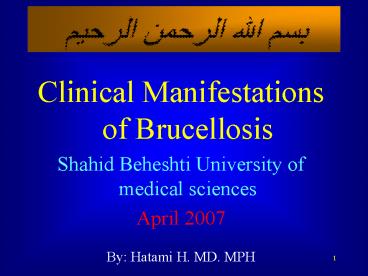Clinical Manifestations of Brucellosis - PowerPoint PPT Presentation
1 / 29
Title:
Clinical Manifestations of Brucellosis
Description:
Lassitude is a prominent symptom. Chest pain worse on ... Symptoms especially lassitude, may persist for many weeks or months. Convalescence may be slow ... – PowerPoint PPT presentation
Number of Views:715
Avg rating:3.0/5.0
Title: Clinical Manifestations of Brucellosis
1
??? ???? ?????? ??????
Clinical Manifestations of Brucellosis Shahid
Beheshti University of medical sciences April
2007 By Hatami H. MD. MPH
2
Clinical classification
1) Subclinical illness 2) Acute disease 3)
Subacute disease 4) Localized disease 5)
Relapsing disease 6) Chronic disease 7)
Brucellosis like reaction
3
1- Subclinical illness
- Children in endemic areas frequently have
subclinical illness - Subclinical cases outnumber clinically evident
cases of brucellosis, by 12 to 1
4
23- Acute subacute
- Incubation period several weeks to months (1-3
weeks) - May occur as a mild, transient illness or as an
explosive, toxic disease - 50 of patients have an abrupt onset
- Symptoms are protean and nonspecific
5
23- Acute subacute
- Over 90 of patients experience
- Malaise
- Chills
- Sweats
- Fatigue
- Weakness
- Fever
6
23- Acute subacute
- More than 50 of patients have
- Myalgia
- Anorexia
- Weight loss
7
23- Acute subacute
- Fewer patients complain of
- Arthralgia
- Cough
- Testicular pain
- Dysuria
- Ocular pain
- Visual blurring
8
23- Acute subacute
- Headache, occipital or frontal
- Intense back pain
- Pain in the arms and legs
- Sweats, typically drenching
- Shaking chills, before or after sweats
- Extreme prostration
9
23- Acute subacute
- Lassitude is a prominent symptom
- Chest pain worse on breathing
- Palpitation due to an arrhythmia
- Abdominal pain with constipation
10
23- Acute subacute
- Confusion with nightmares and somnambulism
- Symptoms especially lassitude, may persist for
many weeks or months - Convalescence may be slow
11
23- Acute subacute
- Fever often grater than 39-40ºc occurs in 95
- Undulating or intermittent fever pattern is
unusual - A relative pulse-temperature deficit may occur
12
23- Acute subacute
- Splenomegaly (10-75)
- Lymphadenopathy (14)
- Axillary, cervical, and supraclavicular locations
are most frequent - Hepatomegaly is less frequent
13
Symptoms of acute brucellosis in patients
admitted in Loghman hospital
14
(No Transcript)
15
23- Acute subacute
- Laboratory changes
- Serologic response
- Mild anemia
- Lymphopenia
- Lymphocytosis
- Thrombocytopenia
- Pancytopenia
16
4- Localized disease
- May localize in almost any organ
- Most common in bone, CNS, heart, spleen, testes,
liver, gallbladder, kidney, prostate . . . - May occur simultaneously at multiple sites
- Most often appear in association with a more
chronic course of illness
17
5- Relapsing disease
- Up to 10, after antimicrobial therapy
- Due to intracellular location
- Occur most frequently within months after initial
infection
18
5- Relapsing disease
- May occur as long as 2 years after apparently
successful treatment - It is sometimes precipitated by another infection
or by trauma - Both relapses and re-infections tend to be milder
than the initial episode
19
6- Chronic brucellosis
- May be manifested as
- An insidious onset
- Recurrent relapses
- Localized disease
- Persistent illness
20
6- Chronic brucellosis
- A duration grater than 1 year
- May caused by inadequate treatment
- Symptoms are not associated with clinical,
microbiologic and serologic evidence of active
disease
21
6- Chronic brucellosis
- Persistent fatigue
- Malaise and insomnia
- Recurrent depression
- Vague pain inertia
- Sexual impotence
22
6- Chronic brucellosis
- The onset may be
- - Insidious
- - Follows an acute attack
- It may be due to untreated or inadequately
treated disease - Story of recurring flu with lassitude, headache,
pain, sweats
23
6- Chronic brucellosis
- Frontal or retroorbital headache
- Low back pain is common, and unassociated with
radiological evidence of spondylitis
24
6- Chronic brucellosis
- Limb pain or stiffness is more often muscular
than articular - Sweats occur especially on effort and also at
night - Temperature is usually normal
25
7- Brucellosis like reaction
- Recurrent exposure to brucellae in seropositive
persons may cause hypersensitivity reactions - These reactions can mimic brucellosis and
manifested with chills and fever within minutes
to hours and last 24-48 hours
26
7- Brucellosis like reaction
- Patients with chronic brucellosis may also be
hypersensitive to brucella antigen. - Persons hypersensitive to brucellar antigen need
not be suffering from chronic brucellosis - Distinction must be made between chronic
brucellosis and hypersensitivity
27
Clinical differences
- Br. Abortus infection are much milder and run a
shorter course - Br. Melitensis infection may be very persistent,
lasting over one year or more - Br. Suis causes suppurating complications and a
chronic - state of debility
28
??????? ???? ?? ????? ????? ??????
???? ???? ?? ?????? ?? ????? ???? ???? ??? ????
???? 19 ?????? ?? ?????? ?? ????? ??? ?????? ??
?????? ???? ??? ????? ?? ???? ?? ???? ????????
???? ??? ???? ??????? ????? ?? ???????? ???? ???
??? ???? ???? ???????? ???? ????? ???? ?????
????? ???? ?? ?????? ??????? ???? ?? ????? ????
?? ???? ??? ????? ?????? ???????? ?????? ???.
29
??????? ???? ?? ????? ????? ??????
????? ??? ?????? ?? ??? ????? ?? ????? ????
????? ?? ????? ?????? ?????? ?? ??????? ?? ?????
???????? ??? ?? ?????? ???? ?? ??? ?????? ??
????? ???? ???? ?? ????? ????? ??? ?? ???? 19 ??
??? ??????.































